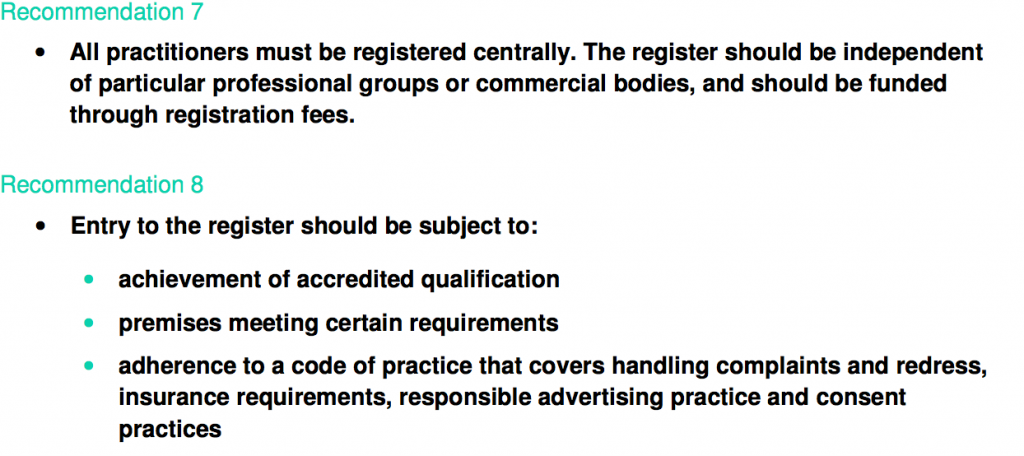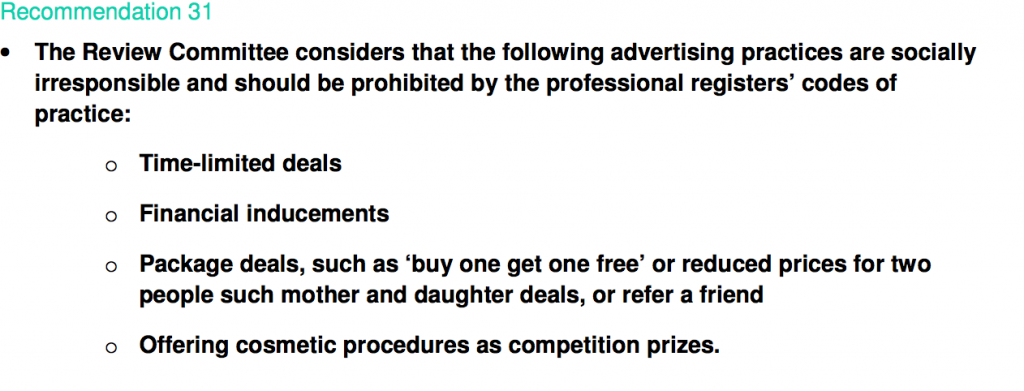Keogh Report
April 26th, 2013We all sat patiently waiting for the latest recommendations by Sir Bruce Keogh after suggestions that the cosmetic industry failed to provide enough protection to the public, citing a similarity between the purchase of a simple item of stationery. On Wednesday 24th April the report received mixed reviews. Some felt it wasn’t detailed enough, some felt it would place too many restrictions on practitioners. Some even wondered whether it would come to fruition following the backlash that the Leveson report had from publishers.
Which of the forty recommendations will actually have an effect on the non-surgical industry? We have decided to review these recommendations and suggest how we feel it may impact on our industry.


Recommendation 39 & 36: Cosmetica Training always state that before you inject someone post training, even if you are treating a close friend or colleague, that you have insurance in place. This insurance will be displayed for all to see on the proposed practitioner register. Keogh stated that IHAS unfortunately should not hold the register. As holding insurance for practise is a necessity for public protection, this recommendation is vital and will serve to allow the public to see that the injector they are using holds valid and up to date insurance.

Recommendation 38: If a non-surgical provider closes their business, their patients should continue to have protection. Some insurance providers initiate a run off cover to ensure that a claim can be made after someone has stopped working. Clarification needs to be sought as to whether this run off cover is only in place whilst a policy is in force. This is a further step in the right direction for the industry to ensure patients benefit from corrective procedures if their injector ceases to trade.
Recommendation 37: The same cover should be available for medical devices. Instantly we think of the PIP scandal and how the NHS has covered the cost of surgery when surgical companies have failed to provide the necessary care for the patient free of charge.
Recommendation 32: Aftercare following aesthetic treatments is highly important and it is our view that patients should be able to contact their practitioner and return for review appointments without question. For those who are working in the NHS whilst running an aesthetics clinic should have in place a dedicated phone number for their patient to contact them on.
Recommendation 29, 30 & 31: A business relies on advertising be it in magazines or social media. Often companies use special offers to capture new business and some aesthetic practitioners severely undercut their costs to increase the volume of patients coming through their clinic. This will no longer be allowed. This surely will be a good thing will it not? Our prices to models are low in view of the fact that they are being treated by a medical professional learning how to do the procedures. We sometimes offer a free service as a thank you to our followers but this will no longer be allowed. To use such offers to entice patients to undergo treatment may not be viewed as responsible by the report and therefore alternative methods of ethical advertising must be utilised.


Recommendation 12 & 28: Insurance companies require all patients to sign a consent form, whilst other forms of consent may exist; such as implied consent, in order to prove in some way that potential side effects have been discussed and that consent has been attained, a patient signature will provide this. Included in such paper work should be the medical history and treatment plan. These recommendations are merely re-iterating what should already be carried out in clinic.


Recommendation 15 & 4: Currently a nurse who does not hold a prescribing qualification can purchase and administer a dermal filler without their patient requiring a consultation by a doctor, dentist or nurse prescriber. If dermal fillers were no longer classified as a medical device and became a prescription only medicine, the nurse would have to follow the same legislation that currently covers botulinum toxin administration. This would not impact on practice if the nurse currently administered toxins but would have financial and time implications for nurses who only administered dermal fillers.

Recommendation 14: It is the responsibility of the training provider to ensure that they include in their theory all the required information. After this, it is the responsibility of the practitioner to ensure they comply with legislation and keep up to date with every aspect of their position.

Recommendation 7 & 8: The rep0rt suggests “a register should be in place for everyone” who administers aesthetic procedures. This will have annual cost implications and ongoing training requirements for each practitioner. The fees are yet to be announced although reference was made to cosmetic standards in Denmark.

Recommendation 6: If all training is to become accredited the future cost of training courses will inevitably increase. Why not book further training now whilst costs remain as they currently are? It will be interesting to see if those who are currently injecting will have to undertake further courses in order to obtain such qualifications. Such action may not be justifiable.

Recommendation 5: This is the topic that sparks outcry of those who are in favour and those who are against the subject; should beauty therapists (BT) inject? Referring back to Denmark, a BT can inject there but only dermal fillers and they need to be employed by a doctor to do so. Keogh on the other hand states that they should be allowed to inject in certain circumstances and upon proving their knowledge. However, they should only be allowed to do so if a prescriber is supervising them. Questions are raised as to whether a prescriber would give their time to supervise a BT if they could undertake the treatment themselves and achieve a higher rate of income.
Whatever happens imposed standards will be of benefit to the industry for practitioner and public protection. It will hopefully see an end to the less ethical injectors in the UK and allow a professional standard of care to be in place across the whole aesthetics arena.








